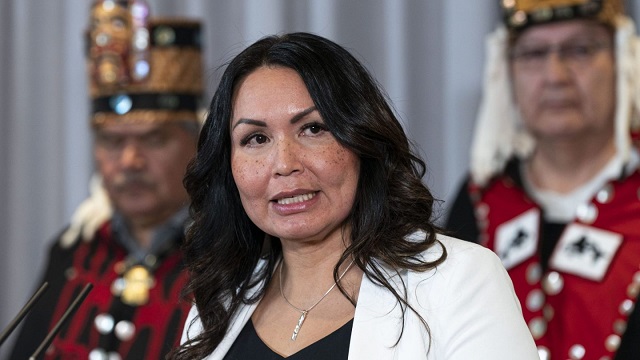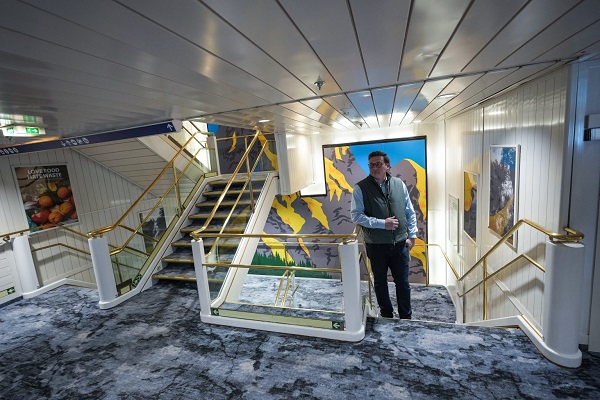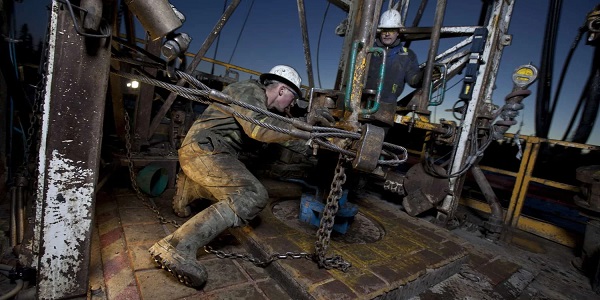Energy
LNG leader: Haisla Nation Chief Councillor Crystal Smith on the world’s first Indigenous project

Haisla Nation Chief Councillor Crystal Smith during a press conference announcing that the Cedar LNG project has been given environmental approval in Vancouver, Tuesday March 14, 2023. CP Images photo
From the Canadian Energy Centre
By Will Gibson‘Now we are working together to make our own opportunities as owners and developers of the resource’
Growing up in the 1980s, Crystal Smith felt supported and nourished by her community, the Haisla Nation along the shores of Kitimat, British Columbia. But at the same time, she also sensed the outside world had placed some limitations on her future.
“I enjoyed a wonderful childhood with a solid foundation and lots of love, especially from my grandma Cecilia Smith. She raised me because I lost my mother and stepdad at a young age. But it wasn’t popular to be Indigenous when I grew up,” says Smith.
“A lot of people would talk about how Indigenous people were not expected to be successful. That kind of talk really affected my confidence about what I could be.”
Smith, now the Haisla Nation’s elected chief councillor, never wants children in her community to feel those constraints.
Her community has seized on a major opportunity to build prosperity and resiliency for future generations. The Haisla Nation is a partner in the proposed $3.4 billion Cedar LNG project, the world’s first to have Indigenous ownership. A final go-ahead decision for the project to proceed is expected by the middle of this year.
Smith, who has served as board chair of the First Nations LNG Alliance since 2019, has already seen tangible changes in her community since the project was announced.
“It’s hard to put into words about the impact on the ground in terms of how this opportunity has affected our members in their lives,” she says.
“We were just interviewing candidates to serve as board directors on our economic development corporation and one candidate, who is from our community, just amazed me with how far he has come in terms of pursuing his education and how much his career has progressed.”
 The town of Kitimat on British Columbia’s west coast. LNG Canada site in background. Photo courtesy District of Kitimat
The town of Kitimat on British Columbia’s west coast. LNG Canada site in background. Photo courtesy District of Kitimat
Of her own career, Smith says she knew since college that her future was in serving the community. She started working in the Haisla band administration in 2009 and was first elected chief councillor in 2017.
“I was lucky because my family really pushed me to seek an education after high school, so I took the business program at Coast Mountain College. I also helped that I had mentors in my community, including my father Albert Robinson, who served as an elected Haisla councillor, and Ellis Ross (now an elected MLA in B.C), who was very inspiring in terms of his vision as chief councillor and encouraged me to take the step into elected office,” Smith says.
“When I came back to the community from school, I knew I would end up working in our band office. I wanted to see more opportunities for people in my community and LNG provides that.”
She already sees the benefits of the development, as well as the Haisla Nation’s participation in the LNG Canada project, within her own family including for her grandsons.
“Xavier is six and he goes to the same school I attended as a child. He gets to learn parts of our culture, our teachings, as well as the value and importance of family and community. There’s more of an emphasis on our language and culture in the curriculum, which really makes me happy. Luka, who just turned two, will also attend that school when he’s old enough,” Smith says.
“I want programs and services to meet our needs, not the level of government’s needs. And we need to make sure that it is sustainable not just for my grandsons or their peers but for seven generations beyond this one.”
Cedar LNG is coming closer and closer to fruition, with all permits in place and early construction underway.
An eight-kilometre pipeline will be built connecting the recently completed Coastal GasLink pipeline to deliver natural gas to the floating Cedar LNG terminal located along the Douglas Channel near Kitimat.
The facility will be capable of producing up to three million tonnes of liquefied natural gas every year, which will be transported by carriers through the Douglas Channel to Hecate Straight, using the existing deepwater shipping lane, to reach customers in the Asia-Pacific region.
Powered entirely by renewable energy from BC Hydro, Cedar LNG will be one of the lowest carbon intensity LNG facilities in the world. Its so-called emissions intensity will be 0.08 per cent CO2 per tonne, compared to the global average of 0.35 per cent per tonne.

Up to 500 people will work on the project during the peak of construction. Approximately 100 people will be working at the facility full-time during operation, which is expected to start in the second half of 2028.
Smith says the benefits of the project will extend beyond the 2,000 members of the Haisla Nation.
“This work has really helped us reconnect with other Indigenous communities along pipelines and shipping routes,” she says.
“When I was growing up, our communities never had the opportunity to come together because we were separated by the territorial boundaries imposed by the Indian Act. And we were fighting each other for financial scraps from Indian Affairs.
“Now we are working together to make our own opportunities as owners and developers of the resource. That’s very empowering and the most important part. Participating in developing these resources provides independence. It’s the only solution for my nation and other Indigenous communities.”
Business
US Energy Secretary says price of energy determined by politicians and policies


From the Daily Caller News Foundation
During the latest marathon cabinet meeting on Dec. 2, Energy Secretary Chris Wright made news when he told President Donald Trump that “The biggest determinant of the price of energy is politicians, political leaders, and polices — that’s what drives energy prices.”
He’s right about that, and it is why the back-and-forth struggle over federal energy and climate policy plays such a key role in America’s economy and society. Just 10 months into this second Trump presidency, the administration’s policies are already having a profound impact, both at home and abroad.
While the rapid expansion of AI datacenters over the past year is currently being blamed by many for driving up electric costs, power bills were skyrocketing long before that big tech boom began, driven in large part by the policies of the Obama and Biden administration designed to regulate and subsidize an energy transition into reality. As I’ve pointed out here in the past, driving up the costs of all forms of energy to encourage conservation is a central objective of the climate alarm-driven transition, and that part of the green agenda has been highly effective.
Dear Readers:
As a nonprofit, we are dependent on the generosity of our readers.
Please consider making a small donation of any amount here.
Thank you!
President Trump, Wright, and other key appointees like Interior Secretary Doug Burgum and EPA Administrator Lee Zeldin have moved aggressively throughout 2025 to repeal much of that onerous regulatory agenda. The GOP congressional majorities succeeded in phasing out Biden’s costly green energy subsidies as part of the One Big Beautiful Bill Act, which Trump signed into law on July 4. As the federal regulatory structure eases and subsidy costs diminish, it is reasonable to expect a gradual easing of electricity and other energy prices.
This year’s fading out of public fear over climate change and its attendant fright narrative spells bad news for the climate alarm movement. The resulting cracks in the green facade have manifested rapidly in recent weeks.
Climate-focused conflict groups that rely on public fears to drive donations have fallen on hard times. According to a report in the New York Times, the Sierra Club has lost 60 percent of the membership it reported in 2019 and the group’s management team has fallen into infighting over elements of the group’s agenda. Greenpeace is struggling just to stay afloat after losing a huge court judgment for defaming pipeline company Energy Transfer during its efforts to stop the building of the Dakota Access Pipeline.
350.org, an advocacy group founded by Bill McKibben, shut down its U.S. operations in November amid funding woes that had forced planned 25 percent budget cuts for 2025 and 2026. Employees at EDF voted to form their own union after the group went through several rounds of budget cuts and layoffs in recent months.
The fading of climate fears in turn caused the ESG management and investing fad to also fall out of favor, leading to a flood of companies backtracking on green investments and climate commitments. The Net Zero Banking Alliance disbanded after most of America’s big banks – Goldman Sachs, J.P. Morgan Chase, Citigroup, Wells Fargo and others – chose to drop out of its membership.
The EV industry is also struggling. As the Trump White House moves to repeal Biden-era auto mileage requirements, Ford Motor Company is preparing to shut down production of its vaunted F-150 Lightning electric pickup, and Stellantis cancelled plans to roll out a full-size EV truck of its own. Overall EV sales in the U.S. collapsed in October and November following the repeal of the $7,500 per car IRA subsidy effective Sept 30.
The administration’s policy actions have already ended any new leasing for costly and unneeded offshore wind projects in federal waters and have forced the suspension or abandonment of several projects that were already moving ahead. Capital has continued to flow into the solar industry, but even that industry’s ability to expand seems likely to fade once the federal subsidies are fully repealed at the end of 2027.
Truly, public policy matters where energy is concerned. It drives corporate strategies, capital investments, resource development and movement, and ultimately influences the cost of energy in all its forms and products. The speed at which Trump and his key appointees have driven this principle home since Jan. 20 has been truly stunning.
David Blackmon is an energy writer and consultant based in Texas. He spent 40 years in the oil and gas business, where he specialized in public policy and communications.
Energy
A look inside the ‘floatel’ housing B.C.’s LNG workforce

From Resource Works
Innovative housing solution minimizes community impact while supporting the massive labour force needed for the Woodfibre LNG project.
The Woodfibre LNG project — a national leader in Indigenous partnerships and a cornerstone of global energy security — relies on a large construction workforce that drives economic prosperity across the region. For many of these workers, “home” is a ship.
Refitted from a cruise liner into a dedicated accommodation vessel, or “floatel,” this innovative solution houses up to 600 workers near Squamish, B.C., while keeping pressure off local housing and minimizing the project’s community footprint.
These exclusive images, captured a year ago, offer a rare retrospective look inside the original floatel. MV Isabelle X. With a second accommodation ship, the MV Saga X, recently arrived, this photo essay gives a timely, ground-level view of life aboard: individual cabins, a full-service dining hall, recreation spaces and custom laundry facilities. It’s a glimpse into the offshore dormitory that anchors daily life for the crew bringing this vital energy project to completion.

An arcade room is seen on a “floatel” that Woodfibre LNG plans to use to house 600 construction workers at a liquefied natural gas export facility being built near Squamish, during a media tour in Vancouver, on Thursday, May 9, 2024. The ship arrived in B.C. waters in January after a 40-day journey from Estonia, where it had sheltered Ukrainian refugees, but the District of Squamish council voted three to four against a one-year permit for its use last week.

A dining area is seen on a “floatel” that Woodfibre LNG plans to use to house 600 construction workers at a liquefied natural gas export facility being built near Squamish, during a media tour in Vancouver, on Thursday, May 9, 2024. The ship arrived in B.C. waters in January after a 40-day journey from Estonia, where it had sheltered Ukrainian refugees, but the District of Squamish council voted three to four against a one-year permit for its use last week.

A cabin is seen on a “floatel” that Woodfibre LNG plans to use to house 600 construction workers at a liquefied natural gas export facility being built near Squamish, during a media tour in Vancouver, on Thursday, May 9, 2024. The ship arrived in B.C. waters in January after a 40-day journey from Estonia, where it had sheltered Ukrainian refugees, but the District of Squamish council voted three to four against a one-year permit for its use last week.

Bridgemans Services Group president Brian Grange stands at the stern on a renovated cruise ship known as a “floatel” that Woodfibre LNG plans to use to house 600 construction workers at a liquefied natural gas export facility being built near Squamish, during a media tour in Vancouver, on Thursday, May 9, 2024. The ship arrived in B.C. waters in January after a 40-day journey from Estonia, where it had sheltered Ukrainian refugees, but the District of Squamish council voted three to four against a one-year permit for its use last week.

A custom built heat pump unit that allows the ship to avoid using diesel while docked and at anchor is seen on a “floatel” that Woodfibre LNG plans to use to house 600 construction workers at a liquefied natural gas export facility being built near Squamish, during a media tour in Vancouver, on Thursday, May 9, 2024. The ship arrived in B.C. waters in January after a 40-day journey from Estonia, where it had sheltered Ukrainian refugees, but the District of Squamish council voted three to four against a one-year permit for its use last week.

The main entry and exit area for workers is seen on a “floatel” that Woodfibre LNG plans to use to house 600 construction workers at a liquefied natural gas export facility being built near Squamish, during a media tour in Vancouver, on Thursday, May 9, 2024. The ship arrived in B.C. waters in January after a 40-day journey from Estonia, where it had sheltered Ukrainian refugees, but the District of Squamish council voted three to four against a one-year permit for its use last week.

A renovated cruise ship known as a “floatel” that Woodfibre LNG plans to use to house 600 construction workers at a liquefied natural gas export facility being built near Squamish, is seen at anchor in the harbour in Vancouver, on Thursday, May 9, 2024. The ship arrived in B.C. waters in January after a 40-day journey from Estonia, where it had sheltered Ukrainian refugees, but the District of Squamish council voted three to four against a one-year permit for its use last week.

A tugboat and water taxi are seen docked at a renovated cruise ship known as a “floatel” that Woodfibre LNG plans to use to house 600 construction workers at a liquefied natural gas export facility being built near Squamish, at anchor in the harbour in Vancouver, on Thursday, May 9, 2024. The ship arrived in B.C. waters in January after a 40-day journey from Estonia, where it had sheltered Ukrainian refugees, but the District of Squamish council voted three to four against a one-year permit for its use last week.
All photos credited to THE CANADIAN PRESS/Darryl Dyck
Resource Works News
-

 Alberta1 day ago
Alberta1 day agoAlberta Sports Hall of Fame Announces Class of 2026 Inductees
-

 Business1 day ago
Business1 day agoCanada’s climate agenda hit business hard but barely cut emissions
-

 MAiD2 days ago
MAiD2 days agoFrom Exception to Routine. Why Canada’s State-Assisted Suicide Regime Demands a Human-Rights Review
-

 Business2 days ago
Business2 days agoCarney government should privatize airports—then open airline industry to competition
-

 Business16 hours ago
Business16 hours agoCarney’s Toronto cabinet meetings cost $530,000
-

 Business2 days ago
Business2 days agoIs Carney Falling Into The Same Fiscal Traps As Trudeau?
-

 Alberta2 days ago
Alberta2 days agoCarney’s pipeline deal hits a wall in B.C.
-

 Business2 days ago
Business2 days agoWhat’s Going On With Global Affairs Canada and Their $392 Million Spending Trip to Brazil?









